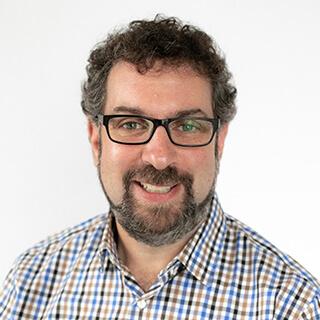Dr. Benjamin M. Jacobs

Dr. Benjamin M. Jacobs
Program Director, Israel Education; Research Associate Professor, Experiential Jewish Education
School: Graduate School of Education and Human Development
Department: Educational Leadership
Contact:
Ben Jacobs directs the graduate programs in Israel Education and Experiential Jewish Education and serves as Special Assistant to the Dean for Jewish Studies Programs. He has spent most of his professional career preparing social studies teachers and Jewish educators for school and non-school settings, and consulting with various Jewish education agencies (including The iCenter for Israel Education, Taglit-Birthright Israel, the Jewish Agency for Israel, and M2: The Institute for Experiential Jewish Education) on curriculum, teaching, and research.
His publications, which have appeared in journals such as Teachers College Record, Theory and Research in Social Education, and Journal of Jewish Education, as well as collections such as the International Handbook of Jewish Education, the Encyclopedia of Curriculum Studies, and the Cambridge Dictionary of Judaism and Jewish Culture, include several studies of the history and theory of social education, Jewish education, and teacher education on the American scene. Along with colleagues Barry Chazan (educational philosopher) and Robert Chazan (Jewish historian), he published a book, Cultures and Contexts of Jewish Education (Palgrave-Macmillan, 2017), which addresses the historical and contemporary centrality of education in Jewish life, as well as its future prospects. He also is co-author of the 18x18 Framework: 18 Jewish Things a Young Jew Should Know, Care About, and Be Able to Do by Age 18.
Jacobs earned his Ph.D. from Teachers College, Columbia University, as a Wexner Graduate Fellow. Prior to arriving at GW in 2015, he served on the social studies faculty at the University of Minnesota and at New York University, where he was co-founder and assistant director of the graduate programs in Education and Jewish Studies. Earlier in his career, Jacobs taught history at the Charles E. Smith Jewish Day School in Rockville, MD.
Jacobs is a past chair of the Teaching History SIG of the American Educational Research Association and of the Network for Research in Jewish Education. He currently serves as co-chair of the advisory board for the Collaborative for Applied Studies in Jewish Education (CASJE) and of the education committee for RootOne.
Ph.D., Teachers College, Columbia University
- Jewish Education
- Summer Institutes, Workshops
- Curriculum Development
- Consulting
Jacobs, B. M. (2018). Critical lessons: Nel Noddings and social education [Special issue]. Theory into Practice, 57(4).
Jacobs, B. M. (2018). Teaching and learning Jewish history in the 21st century: New priorities and opportunities. Journal of Jewish Education, 84(2), 111-130.
Chazan, B., Chazan, R., & Jacobs, B. M. (2017). Cultures and contexts of Jewish education. New York: Palgrave-Macmillan.
Jacobs, B. M. (2014). Social studies as a means for the preparation of teachers: A look back at the foundations of social foundations courses. Curriculum Inquiry, 44(2), 249-275.
Jacobs, B. M. (2013). Social studies teacher education in the early 20th century: A historical inquiry into the relationship between teacher preparation and curriculum reform. Teachers College Record, 115(12).
Jacobs, B. M. (2013). Problems and prospects of Jewish education for intelligent citizenship in a post-everything world. Diaspora, Indigenous, and Minority Education: Studies of Migration, Integration, Equity, and Cultural Survival, 7(1), 39-53.
Jacobs, B. M., & Shem-Tov, Y. (2011). History: Issues in the teaching and learning of Jewish history. In A. Pomson, L. Grant, & H. Miller (Eds.), International handbook of Jewish education (pp. 441-460). New York: Springer.
Jacobs, B. M. (2010). Dewey Laboratory School. In C. Kridel (Ed.), Encyclopedia of curriculum studies (pp. 290-291). Thousand Oaks, CA: SAGE Publications.
Jacobs, B. M. (2009). Affordances and constraints in social studies curriculum-making: The case of “Jewish social studies” in the early 20th century. Theory and Research in Social Education, 37(4), 515-542. [2010 Exemplary Research in Social Studies Award, National Council for the Social Studies]
Jacobs, B. M. (2009). Socialization into a civilization: The Dewey-Kaplan synthesis in American Jewish schooling in the early 20th century. Religious Education, 104(2), 149-165.
Jacobs, B. M. (2008). Social studies. In G. McCulloch and D. Crook (Eds.), International encyclopedia of education (pp. 553-554). London: Routledge.
Chazan, R., & Jacobs, B. M. (2005). Jewish history from the academy to the schools: Bridging the gap. In M. Nisan & O. Schremer (Eds.), Educational deliberations: Studies in education dedicated to Shlomo (Seymour) Fox (pp. 157-180). Jerusalem: Keter Publishing House.
Jacobs, B. M. (2005). What’s wrong with the history of American Jewish education? Journal of Jewish Education, 71(1), 33-51.
- August 2024 - Dr. Jacobs was quoted in the article, "Ronald Lauder-backed Initiative Looks to Boost Non-Orthodox Jewish Day Schools Amid Enrollment Crisis," which appeared on EJewishPhilanthropy.
- March 2024 - Dean Michael Feuer, Dr. Ben Jacobs, and Dr. Arielle Levites were quoted in Washington Jewish Week's article, "George Washington University Launches New Center for Jewish Education."
- March 2023 - Dr. Benjamin M. Jacobs presented on multiple panels at iCON, The iCenter's biannual international conference on Israel Education, including an overview of "Conflicts of Interest," a new evidence-informed professional development program centered on teaching the Israeli-Palestinian conflict, and "Civic Education in an Uncivil Society: Challenges and Opportunities." Over 80 current students and alumni of GW's graduate programs in Israel education were among the 550 attendees at the conference.
- September 2022 - Dr. Benjamin Jacobs joined Bret Stephens, op-ed columnist for The New York Times, and co-author Shuki Taylor, for a conversation about their article, "The Case for Having 'Shoulds' in Jewish Education," as part of the SAPIR Journal webinar series.
- 2022 - Dr. Ben Jacobs was the featured guest on a special episode of the podcast Adapting: The Future of Jewish Education, hosted by David Bryfman of the Jewish Education Project in New York City, focusing on "The Aftermath of the Maus Controversy" and its implications for Holocaust education in public schools and Jewish education settings.

